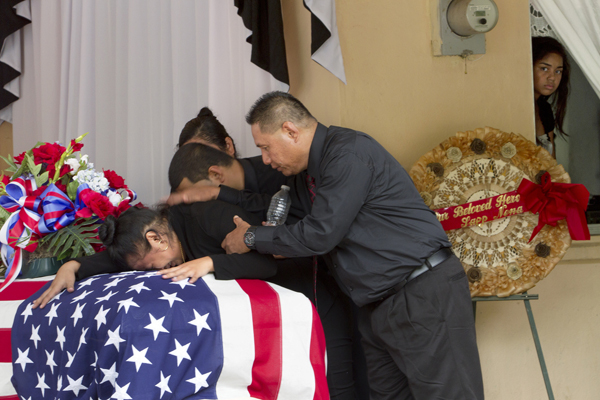This affecting documentary centers on what is technically an independent nation, yet it sees many of its young men and women travel far away to join America’s military. The film’s earliest scenes include a funeral for a citizen of Kosrae, one of the islands that make up the Federated States of Micronesia. The departed, whose nickname was “Sapp,” served with the U.S. Army in Afghanistan when he was killed in action. Director Nathan Fitch explores why so many Micronesians risk their lives for a country that isn’t their own, and the effect such decisions have on their homeland.
Through archived footage, the film recounts the history of Micronesia, from the Japanese Imperial Forces’ takeover of it, circa 1919, to its “liberation” by Americans during World War II. It remained a U.S. colony until 1986, at which point the Compact of Free Association granted Micronesia its independence, although to this day, it still relies heavily on American financial aid. From the onset, Fitch emphasizes the dichotomy that exists in Kosrae, as images of lush foliage and clear water give way to the population, most of whom are living in poverty.
For many islanders, their only option is to join the U.S. military, which is allowed under the compact. However, the personal and social costs can be far-reaching. Not only did Sapp’s parents lose their son in his prime, but as they are informed by the U.S. Department of Veterans Affairs, the unique status of Micronesia means they receive no death benefits, either in the form of money or healthcare services. The injustice of the situation spurs an older islander named Madison, who attended Sapp’s funeral, to travel to a health conference in Washington, DC, where he hopes to speak to the VA.
Sapp’s family’s ordeal is easily the most heartbreaking story line in the film, though it also follows Madison’s youngest son, Arthur, as he also enlists and then travels to Georgia for basic training. What he finds stateside is a far more heterogeneous culture than he is used to, and he’s alienated as a result. Meanwhile, his absence back home means that his father has no one to take care of the family farm and fishing business, a microcosm for the larger societal problem facing Kosrae: that with no one to pass the traditional ways down to, they might be lost forever.
Fitch displays a keenly awareness of the sense of dissonance his subjects experience in unfamiliar surroundings. During certain scenes—the thoroughly Westernized Army recruitment center at Kosrae, Arthur’s graduation ceremony as he exits basic training—the director plays with noise levels, making sounds in the background either loud enough to be distracting or partially muted. In this way, he focuses our attention on Arthur and others and their sense of disconnect from what is happening around them.
Island Soldier, however, does acknowledge the once-in-a-lifetime opportunities that the American military offers. Another transplant from Kosrae, an Army sergeant named Kilfrank, has been serving for years and relocated his family to America so they could take advantage of the educational opportunities. He arguably represents the best possible outcome for someone like Arthur. Kilfrank benefits from his adopted country while staying connected to his roots.
In addition, Fitch seems genuinely admiring of the camaraderie between soldiers in the footage taken of Sapp’s unit in Afghanistan. The mutual respect they have for each other is clear through their easy bantering. The idea of the armed services as the means by which friendships across different races and nationalities can form is a theme that gets revisited more than once. Indeed, another soldier, Mario, who lives in San Diego, hopes to travel to Kosrae in order to pay tribute to Sapp, culminating in one of the film’s most triumphant moments.
While some of those who are profiled display a surprising lack of agency in solving their problems, that seems to be the point: the citizens of these islands don’t have much say when it comes to their relationship with America. The film makes sure we are aware that the Compact of Free Association expires in 2023, at which point the islands’ future will be up in the air. (The aid will end, although the United States will retain military control.) What’s evident is that at the moment, these communities couldn’t possibly sacrifice more and receive less in recognition or compensation.

















Leave A Comment